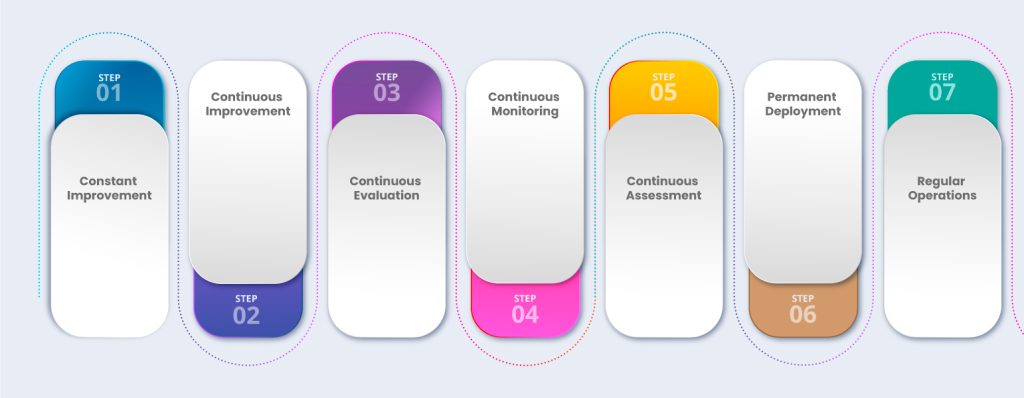When you think about all the difficulties involved in creating your DevOps team, outsourced DevOps as a managed service makes a lot of sense, especially for startups and business owners. You can get specialized talents through outsourcing, just like with marketing, graphic design, or legal guidance, without having to incur the financial and administrative costs of bringing these services in-house.
Having said that, Managed DevOps isn’t a wise decision in every circumstance. You will learn about the significance, contribution, causes, stages, benefits and drawbacks of outsourced DevOps in this post.
Why is outsourced DevOps important, and how does it contribute?
The global DevOps market reached $7 billion in 2021 and is expected to reach $26 billion by 2027, growing at a CAGR of 24.5%. This demonstrates that the adoption of DevOps is a growing concern among global companies because they start understanding its importance and benefits.
Outsourced DevOps come as a combination of multiple techniques and practices aimed to speed up the development of new products and simplify the maintenance of existing ones. However, the main contribution of this methodology is that it builds straightforward communication between development and operations teams.
This is achieved by applying the continuous delivery model, automating part of the workflow, and using collaboration platforms that keep the processes transparent. As a result, you get high-quality software faster and teamwork remains at top levels.
Phases of outsourced DevOps workflow

The stages of the workflow stay the same even when you outsourced DevOps services; continuous cycle cycles all operations until you achieve the target product quality.
1. Constant Improvement
Your outsourced DevOps team is required to organize the project and begin coding throughout the continuous development stage. All of the needs are discussed with all of the stakeholders. Because the developers must code anytime new features or performance problems arise, it is a constant and agile process.
2. Continuous Improvement of outsourced dev0ps
Because it requires developers to often update the code and add new features, the continuous integration phase is considered to be the most important in the entire workflow. Testing is necessary after each new iteration of updates to maintain software quality.
Although there are many solutions available for continuous integration, Jenkins, CircleCI, and Travis are some of the most well-liked choices. They are employed in testing and building automation.
3. Continuous Evaluation
Testing procedures of every kind are used before, during, and following the integration of new modules. The quality assurance team must put in a lot of effort to produce bug-free software, and an outsourced DevOps engineer would advise adopting automation. Delivering applications that are free of errors is a terrific approach to saving time and effort.
We might mention Selenium, TestSigma, Eggplant, and other tools as some of the most popular ones for continuous testing. They are used for automated testing.
4. Continuous Monitoring
Continuous monitoring seeks to identify system flaws such as limited memory or unreachable servers. To make sure app performance is always high, your engineers are expected to find these problems and repair them. The team goes through the entire DevOps cycle if the issue is critical to identify a fix and any other potential mistakes.
Sensu, New Relic, and Splunk are a few of the tools used for continuous monitoring. These are employed to monitor metrics and keep tabs on various software processes for outsourced DevOps.
5. Continuous Assessment
Getting customer feedback via surveys or social media is a fantastic approach to gaining a new perspective on how your programme functions from the perspective of the user. By hiring DevOps specialists, you can have a defined method for gathering and analyzing feedback from numerous sources to provide an overall picture of what’s happening and what to change.
There are numerous methods for interacting with feedback, ranging from straightforward Google Forms for focused surveys to analytics platforms like Pendo.
6. Permanent Deployment
Since sending the finished code to the servers is the main focus of the continuous deployment phase, it is also essential. Configuration management, which guarantees a successful deployment, and containerization are two components of DevOps (to support consistency in all environments).
While technologies like Docker are more of an addition to assist the stage’s scalability, businesses employ tools like Chef or Ansible to handle the configuration during deployment. There are numerous other open-source programmes available that can be used for various purposes.
7. Regular Operations
Continuous operations, the last level, aims to reduce maintenance-related downtime. Companies may lose money due to downtime at a rate of $5,600 per minute, or more than $300,000 per hour. Because of this, an organization that outsources DevOps would implement a method to prevent downtime and guarantee the availability of the app’s services.
To save time and money and ensure that your company’s application is ready faster, container management tools like Docker and Kubernetes are typically utilized.
Outsourced dev0ps roles and responsibilities

A DevOps developer who is outsourced has a variety of duties that change depending on the project. Typically, it would be accurate to say that this specialist’s focus is on process automation and process unification to speed up development while maintaining high standards. Let’s look more closely.
1. Ci/Cd Pipelines Support
The continuous integration and delivery pipelines must be designed, built, tested, and maintained by an outsourced DevOps programmer. The tools are also chosen by this expert.
Companies may regularly release code and enable continuous improvement thanks to CI/CD pipelines. The DevOps engineer establishes these criteria, and it is a never-ending cycle that only comes to a stop when the desired level of quality is reached.
2. Customer And Team Cooperation
A DevOps engineer needs to be aware of the project’s customer-side requirements as well as the best KPIs to employ when forecasting results. The specialist’s job also includes managing stakeholders and serving as a mediator in discussions to ensure that both parties comprehend one another.
The engineer’s job is to coordinate the two parties and maintain clear communication, serving in part as a project manager. Soft skills that are strong guarantee that everyone is happy with the collaboration.
3. Risk Assessment And Vulnerability Analysis
Regular vulnerability assessments are necessary because modern software security is one of its pillars. An outsourced DevOps engineer is responsible for managing software risks and implementing cybersecurity measures. A potential threat must be avoided at all costs.
4. Various Other Tasks
A DevOps engineer is responsible for numerous tasks that change depending on the project. The deployment of the DevOps culture, team mentoring, code review, and validation are a few examples.
But much depends on the project and its specifications.
Reasons to outsourced DevOps for your project

DevOps principles are actively and inactively promoted by 86% of enterprises. Startups frequently seek ways to get their products to market more quickly, therefore working with a DevOps outsourcing firm is the best option.
Your business may locate skilled engineers worldwide by outsourcing from a dependable partner like EAB Global’s verified talent engagement platform. Additionally, unlike most internal employees, this introduces a variable pricing strategy that isn’t constantly bound to pay.
Pros & cons of Outsourced DevOps

It is claimed that firms who outsource DevOps have 24 times faster failure recovery, 22% less time spent on unplanned work, and 3 times fewer change rate failures. There is the following studies presented in the State of DevOps Report.
Other topics need to be addressed. To give a broad overview of the advantages and disadvantages, we have selected the most well-known solutions.
Pros
Ø Worldwide talent pool
One of the main advantages of using the outsourcing approach when working with DevOps engineers is having access to the world’s talent pool. Although it may be difficult to discover an internal specialist, opening up the recruiting market to the world allows you to find the necessary knowledge from any nation. This streamlines the hiring process and gives you more varied possibilities.
Ø Reduced development cycle length
Companies gain fully from top-tier DevOps experience when working with a consulting/outsourcing firm. This calls for efficient and open communication, the automation of the majority of operations, and the ongoing improvement of your product. When hired engineers collaborate, the standard development process moves much more quickly since they immediately put the best practices into effect.
Ø Affordable Solutions
DevOps seeks to automate the majority of operations, saving you time and money in the process. Development teams can concentrate on more crucial work while scripting boring tasks. Additionally, working with an external DevOps engineer offers your business a flexible pricing plan that is typically less expensive than hiring an internal specialist.
Ø Greater flexibility and calibre
It is less likely that any flaws or problems will go undetected because DevOps uses the continuous paradigm. Potential problems are largely eliminated throughout the testing and monitoring phases, guaranteeing that your business receives a solution that performs at its highest level.
Ø Better risk management
Outsourced teams typically have rich backgrounds in the industries you need, so they already know how things work here. Experienced engineers apply the best DevOps practices to mitigate risks and deal with challenges before they even appear on the horizon.
Cons
Ø Rearrangement of the work model in outsourced dev0ps
DevOps needs a clear cultural shift in your startup because it alters the methods in which employees are used to working. Your team members must concentrate on the product-centric full-lifecycle models rather than sticking with the project-based models. These call for getting various teams to collaborate on the same objective. It can be difficult, especially in conservative settings where there are few leaders.
Ø Demands technical expertise
Cooperation with a DevOps team necessitates technical expertise in areas like infrastructure, testing tools, CI/CD processes, and other crucial elements required to establish proper product requirements. If you don’t have the necessary engineering knowledge, you won’t be able to create the job and track the results.
Ø Requires strong teamwork
Now, you can probably see that DevOps emphasizes strong collaboration between different team members. Everyone comes from various backgrounds, and making them work together is quite a challenge. Applying the DevOps culture step by step is what helps here.
It’s Time to Leverage the Benefits
To help you accelerate development and receive relevant expertise at a flexible price, 0SCALE.IO offers DevOps as a service. Hiring our DevOps staff is like putting a Ferrari in eighth gear.
Why choose 0SCALE.IO Anywhere Business as your partner for outsourced DevOps
The most important step in integrating DevOps methods in your business is selecting the appropriate partner. In the area of outsourcing software development services, 0SCALE.IO offers the best services:
Ø 48-hour start time
After we have approved all developers and signed the contract and NDA, our team will be prepared to start working on your project in no more than 48 hours. We recognize how crucial it is for startups to work as quickly as they can while keeping excellent quality, therefore we do just that. Upsizing or downsizing your team to respond to the shifting market simply takes two days. We place a premium on efficiency, adaptability, and quality.
Ø The best developers are at your disposal
For your project, we screen, choose, evaluate, and hire people. You may obtain a developer who is ready to start working in 2-4 weeks because 0SCALE.IO takes care of the entire hiring procedure. We offer more than just a contact; we also offer specialized knowledge. You will receive the appropriate training for small, medium-sized, and large organizations.
Ø Ideal cultural fit
The developer talent pool of 0SCALE.IO includes people from all around the world. We can therefore give you access to a specialist who works in your time zone. Whether you live in the US, Canada, Australia, or Europe makes no difference. We always have a good option. Since the team members update you frequently and keep the development process open, you have complete control over the project.
In The Nutshell
Any size startup can benefit from outsourcing DevOps since it provides access to world-class talent at a competitive price. Because they may receive professionals with the right industry expertise and experience using the best practices, businesses can greatly profit from employing these services remotely.
The largest difficulty, though, is deciding on a reliable business with whom to collaborate. To produce the greatest code quality at a fair price with on-time software delivery, picking a reliable technology partner is crucial. With that, 0SCALE.IO Anywhere Business can be of assistance.


